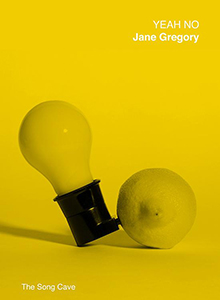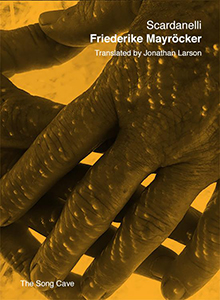Yeah No, by Jane Gregory. The Song Cave, 112 pp., $17.95.
Scardanelli, by Friederike Mayröcker. The Song Cave, 72 pp., $17.95.
The Song Cave made its small-press debut in 2013 with the publication of A Dark Dreambox of Another Kind: The Poems of Alfred Starr Hamilton, an extraordinary entry into the charged field of poetic recovery projects. That same year it also published the young American poet Jane Gregory’s first full-length collection, My Enemies. Gregory’s new collection, Yeah No, is arguably the most formally innovative American poetry publication of 2018.
The bulk of Yeah No is comprised of a series of poems entitled “Profices.” It’s hard to tell whether Gregory intends “profice” to mean the second-person singular Latin imperative of proficio—the command to make or construct something—or a homonymic pun on “prophecies.” Gregory’s “profices” are glittering micro-constellations of language, preoccupied with what happens when patterns devolve, deteriorate, fail: “That it goes from all / shall be well to oh / well,” she opens the book (invoking Julian of Norwich), continuing “Knock knock // Everything’s a pattern / of yesses and nos.” Who’s there is the pattern, the degrading pattern that is nevertheless part of a “terrific,” lucid, sumptuous world. What’s so striking about Gregory’s idiom—which is crystalline, and often abstract in a way that recalls certain Language poets—is that she never denies the world’s sheer extravagance. She’s also not afraid of appropriating the direct baroque address of the Romantics: “There is a flashing forth by which / I enter your heart and instruct you,” opens another poem, “Action Is Content and Content without Action Is Desire.” Language is a construct, sure, and so is desire; instruction certainly is.
And so are Gregory’s forms. Yeah No is a formal tour-de-force, as rich in its evolutions and divagations as any collection by Duncan. Most of the poems are annotated by ghost-text in the right margin, which to my reading is another indication of Gregory’s essential nod to the sumptuous universe: there is so much, no poem can contain it. This tinkering with the page field often strikes me as annoying—in other collections—because I’m not sure how to read it, how the tinkering amounts to a performative legibility within the page field. But in Gregory’s case these emendations seem confidently, even ingeniously polyphonic. If these lyrics are prophetic, then they prophesy within a semantic space of possibility that the self tends gingerly, even tenderly: “Tenderer, tenderer now,” as Gregory puts it, with characteristic polysemy, in “a book of paranoia obviated by paranoia.” Rarely (pax Dali) has paranoia seemed so exalted.
It’s apropos that The Song Cave would also now be adding to the stock of translations of the Austrian poet Friederike Mayröcker. Mayröcker—who just celebrated her 94th birthday—is prolific, and though she’s been well-served in a few English volumes (Rosmarie Waldrop’s Heiligenanstalt and Richard Dove’s Raving Language: Selected Poems, among others), there’s much more. Scardanelli, a late work, takes its title and its cue from Friedrich Hölderlin’s pseudonym, or rather heteronym. In fact the book opens with a 1989 lyric entitled “Hölderlin tower, on the Neckar river, in May” and ends with a slightly puckish 2008 “elegy to Jorie Graham.” If you haven’t read Mayröcker before, her poems arrive with the gust of a great wind: they are fresh, they rearrange things inconveniently, they are glorious in their energies, they evince a Dionysian, decidedly Whitmanian affect and range. Her lyrics typically have the “I-do-this, I-do-that” quality of O’Hara while standing entirely outside the field of social signification that grounds O’Hara: she’s simply a larger persona, or she has constructed a larger persona for herself, or a larger persona has reconstructed her, book by book. As with O’Hara (or Duncan), nothing is alien to her thought or experience, but everything is transposed into another key, the key of Mayröcker. It’s a rare poet who can get “the BÜRGER CAFÉ,” the blood of Jesus (“who can / save me”), and the “red elongate / leaflets from the robinia tree” into a single 13-line lyric without condescending to any of them, without irony. Mayröcker can, and does. She is a visionary whose vision fully encompasses, but is never limited to, the banalities, domesticities, and eccentricities of our present moment.
It’s hard not to read many of the later poems in this collection as elegies for Mayröcker’s husband, the poet Ernst Jandl, who died in 2000. (See also Mayröcker’s Requiem for Ernst Jandl, translated by Roslyn Theobald and published by Seagull in 2018.) The thing about the self is that, in its enlargement, it comes to include other selves—including the selves of those we love. Their loss constitutes a radical diminishment, which the self nevertheless reoccupies. Our usual word for this is “grief.” But for Mayröcker loss, even grief, is swept up again and again in the gusts of high-wire ecstasy that have always buoyed her work. In a coda to her short poem “Venice fantasy,” Mayröcker notes “(there the words tore themselves loose this very / morning I spit blood gasp through blackbird-gardens and / blossom-death have wrapped the fish in old newspaper).” Even as Mayröcker approaches her own end, hers remains a poetry of breathless apprehension, of unmistakable and unavoidable “HIGH-SPIRITS,” of “devout gardens” in which everything is gathered and celebrated, imbued with value and numinous delight.


